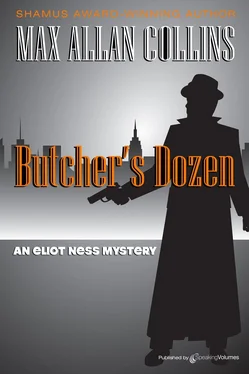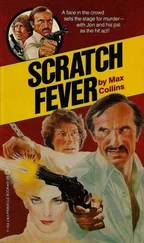Max Collins - Butcher's dozen
Здесь есть возможность читать онлайн «Max Collins - Butcher's dozen» весь текст электронной книги совершенно бесплатно (целиком полную версию без сокращений). В некоторых случаях можно слушать аудио, скачать через торрент в формате fb2 и присутствует краткое содержание. Жанр: Криминальный детектив, на английском языке. Описание произведения, (предисловие) а так же отзывы посетителей доступны на портале библиотеки ЛибКат.
- Название:Butcher's dozen
- Автор:
- Жанр:
- Год:неизвестен
- ISBN:нет данных
- Рейтинг книги:3 / 5. Голосов: 1
-
Избранное:Добавить в избранное
- Отзывы:
-
Ваша оценка:
- 60
- 1
- 2
- 3
- 4
- 5
Butcher's dozen: краткое содержание, описание и аннотация
Предлагаем к чтению аннотацию, описание, краткое содержание или предисловие (зависит от того, что написал сам автор книги «Butcher's dozen»). Если вы не нашли необходимую информацию о книге — напишите в комментариях, мы постараемся отыскать её.
Butcher's dozen — читать онлайн бесплатно полную книгу (весь текст) целиком
Ниже представлен текст книги, разбитый по страницам. Система сохранения места последней прочитанной страницы, позволяет с удобством читать онлайн бесплатно книгу «Butcher's dozen», без необходимости каждый раз заново искать на чём Вы остановились. Поставьте закладку, и сможете в любой момент перейти на страницу, на которой закончили чтение.
Интервал:
Закладка:
"Not quite," Ness said. "Of the suspects Detective Merlo has brought in for questioning, we've held on to forty-some who were found guilty of offenses ranging from misdemeanors to robbery, burglary, and assault."
The audience began to applaud, but Merlo waved them to stop.
"I appreciate the sentiment," Merlo said, "but I'd prefer we postpone the congratulations until this sick bastard is either dead, or in jail waiting to die."
There were nods of approval in the audience, and Ness put a hand on Merlo's shoulder, saying, "There's been some play in the press about the safety director's office taking charge of this investigation. And that happens to be true. I plan to be personally involved-but Detective Merlo remains on the job. I'm partnering him with one of my own top investigators, Detective Albert Curry, who with Detective Merlo was at the scene of the first Kingsbury Run find."
Ness gestured to Curry, who stood and turned and smiled tightly to the assemblage and sat down.
For the next hour the group discussed and probed the slayings, and finally Ness said, "Gentlemen, I appreciate your attention and welcome these comments, insights, and ideas. But let us keep in mind-tonight we're right where we were the day the first body was found."
The group, many of them nodding solemnly, rose and began threading their way out of the room.
Wild approached Ness and said, "So, you think because you're not a vagrant, you're safe from this guy."
Ness shrugged.
"If that's what you think," Wild said, "you're as nutty as he is. Nuttier. You've declared war on a mass murderer, you fruitcake."
'Well," Ness said pleasantly, "he knows where he can find me. Buy you a drink?"
CHAPTER 5
Kingsbury Run was a good place to live.
That's how Ben saw it. Right in the middle of the city, here was a wide-open place where a man could fend for himself-and keep to himself. There was game to hunt-squirrels, wild dogs, pigeons, Hoover hogs (jackrabbits)-and if a man wanted to make his own fire and cook his own food, he would be left alone. At least Ben usually was. Folks in the jungle, the shantytown near the Thirty-fifth Street Bridge, knew about Ben, and Ben's knife.
Even without his king-size jackknife, Ben was nobody anybody in his right mind would mess with. That knowledge gave Ben a certain amount of satisfaction, if not exactly pride.
Only five six, Ben was broad-shouldered, a barrel-chested, threatening looking mole of a man whose dark blond hair was whitening; his clothes were old, even tattered, but he kept them clean. Unlike some, he had underwear; unlike some, he had shoes (boots, actually). He even had an extra pair, hid, in his cave, that he'd excavated high above the creek bed, away from shantytown, covering the opening with boards and tar paper. It was warm in winter, unlike the paper tents and cardboard hovels some of his neighbors endured. And when it got too damn cold, he could always flop at the Salvation Army-though a little bit of that pious Sally crap went a long way with Ben.
It wasn't like Ben was a hermit. He had friends in his world; he even made new ones from time to time. He was liked. He could sing songs from an Appalachian childhood, songs that were about all that was worth remembering from that childhood. Folks liked Ben's singing. Hobos (Ben didn't consider himself a hobo, but he put up with them, just as he did tramps-but he held no truck with bums) put a lot of stock in storytellers, joke tellers, and singers. There was a lot of time to kill in shantytown.
Nights when up the hill drifted the scent of a fine gump stew stewing-stolen chicken mixed with vegetables from the rubbish bins at Central Market-Ben would wander down, and get sociable. It would mean spending some time with folks-singing, putting up with the socialist talk that he'd once put so much stock in-but that was the price. Even in shantytown, nothing was free.
Ben liked being close to the city; there was something reassuring, comforting, about being in a wilderness bordered by city skyline. Best of both worlds, and both were at his fingertips.
With town so near, he could go scrounging for food at Central Market, mooch two-day-old bread from bakeries, or hit the soup kitchens or missions, and pick up the odd job here and there, when need be. Even a man like Ben needed some money. Coffee and sugar and cigarettes couldn't be scrounged. And drinking canned heat and moonshine got old-sometimes a man needed to sit in a saloon and put away some real honest-to-God beer and, praise the Lord and pass the ammunition, hard liquor. That took money. Sometimes a man needed to get his ashes hauled, too-and most of the women riding the rails were either hooked up with some 'bo, or queer. So that took money, too.
He'd never had a wife. He almost did once, when he was working regular, at the slaughterhouse. That was after the war. His brothers told him he was crazy to quit, but they were younger than him, they hadn't been where he'd been. They hadn't got gassed at the Argonne. They hadn't seen waves of young men with guns go charging across no-man's-land to the sound of bombs and bullets and the cries of the wounded and dying. They hadn't put a knife into a wounded comrade to put him out of his misery and stop his screaming.
His family had come from the backwoods to Cleveland around the time he was born (Ben was forty-seven, although he didn't know it, having long since lost track) to get pie-in-the-sky factory jobs like they'd heard so much about. His father worked in a steel mill for about year and then took off forever one day; his mother worked as a seamer in a knitting factory, a sweatshop job that killed her in her twenties. His brothers and sister wandered to other cities and found jobs; Ben had answered the call of the road, just another penniless, unattached drifter hopping freights in search of nothing in particular. Adventure, maybe. Seeing America.
Seeing the world was what he had in mind when he enlisted. And he had indeed seen things in the "great" war, things that had quenched his desire for seeing much more of anything else.
But back home, the public had been protected from the horrors soldiers like Ben had endured; like the song said, "Half a million boots went sloggin' through hell," but you had to have been there to understand. You had to wake up screaming, thinking you were still racing across no-man's-land through bombs and bullets and the cries of
…
His brother Ed was in Chicago, working at Armour in the smokehouse. He helped Ben get a job there; Ben started as a common laborer on the killing floor and made a good impression. He had decided he'd best learn a trade, so he tried real hard, worked real hard; soon the foreman saw that Ben had a way with a knife. Before long Ben was given a better-paying position.
He became a hog killer.
Hogs chained by one rear leg to an overhead conveyer were brought in, squealing, upside down. Ben, standing in one spot as the hogs came helplessly to him, would grip each pig by its throat and dig his knife into its jugular, in a thrust and turn motion. Blood ran off his leather apron; his boots got painted red.
He lasted a week. He didn't ask for any other position at the slaughterhouse; he just hopped a freight and reentered the world of the hobo.
A hobo, which is what Ben was in those days, traveled around looking for work. Whereas tramps were those looking for the open road, for thrills; that described the prewar Ben. But he never was a bum, which was how Ben classified those who never worked at all, beggars who slept in doorways, drunks and junkies, the sort of vagrant that gave folks like Ben a bad name.
In those days after the war, after the slaughterhouse, Ben always thought he'd find work somewhere and settle down. Maybe get back in touch with Ida, the girl in "dry casings" at Armour who he'd been going with when he up and quit the slaughterhouse.
Читать дальшеИнтервал:
Закладка:
Похожие книги на «Butcher's dozen»
Представляем Вашему вниманию похожие книги на «Butcher's dozen» списком для выбора. Мы отобрали схожую по названию и смыслу литературу в надежде предоставить читателям больше вариантов отыскать новые, интересные, ещё непрочитанные произведения.
Обсуждение, отзывы о книге «Butcher's dozen» и просто собственные мнения читателей. Оставьте ваши комментарии, напишите, что Вы думаете о произведении, его смысле или главных героях. Укажите что конкретно понравилось, а что нет, и почему Вы так считаете.












